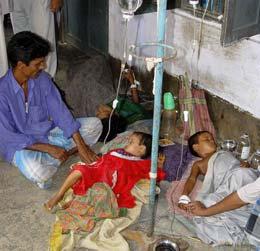Dollar a dose vaccine to prevent diarrhea deaths

A new Canadian program aims to save the lives of about 150 000 children in three states in India by scaling up the use of zinc supplementation and oral rehydration salts.
The Zinc Alliance for Child Health (ZACH) is a movement of Canadian organizations led by UNICEF Canada and Teck Resources Limited, one of the world´s largest producers of zinc.
About 30% of under-five child deaths globally occur in India, according to United Nations estimates in 2011.
"Thirteen percent, or approximately 215,000, of these child deaths are attributed to complications caused by diarrhea, a sickness that is easily treatable with zinc and oral rehydration salts," says David Morley, president and CEO of UNICEF Canada.
A Cochrane systematic review published last year showed that zinc supplementation is effective in reducing the duration of diarrhea in children aged six months or more.
The $5-million, five-year partnership between Teck and ZACH, launched in April, will improve treatment, educate families, caregivers and health professionals about the efficacy of zinc and oral rehydration salts and “strengthen health care systems to help ensure that no child dies from diarrhea in the states of Uttar Pradesh, Madhya Pradesh and Odisham,” says Doug Horswill, senior vice president of Teck.
These states have the highest burden of childhood diarrhea in India. A systematic review of 13 randomized trials in developing nations showed a 43% reduction in all-cause mortality and a 23% drop in diarrhea-related hospital admissions with the use of zinc.
In the initial phase, 2013–17, the program aims to save 150 000 children’s lives. In subsequent years, it hopes to save 50 000 per year in the three states.
"The program will also have larger public health implications,” says Morley. In addition to the training, supply chains will also be strengthened so health workers and families have reliable access to zinc and oral rehydration salts.
Similar programs were previously launched by UNICEF Canada and Teck in Nepal, Peru, Senegal and Ethiopia.
Meanwhile, India says it has developed a low cost vaccine to prevent diarrhea.It is expected to be on the market by next year, and is being hailed as a significant breakthrough.
Health officials say that clinical test results indicate the new vaccine is safe and effective against rotavirus, which causes severe diarrhea in children under the age of five.
Rotavirus is spread through contaminated hands and surfaces, and is common in poor communities across Asia and Africa. The severe dehydration that babies suffer due to a bout of diarrhea takes a toll of half a million children every year.
There are two vaccines in the market for rotavirus developed by multinational drug firms. But their high cost has kept them out of reach for many children across Asia and Africa.
The vaccine developed in India will be just $1 per dose, making it affordable for both families and governments who want to make it part of their national immunization programs.
Doctor M.K. Bhan, who helped develop the vaccine from a strain of the virus discovered in a hospital where he worked in New Delhi many years ago, said it cuts by more than half the risk of diarrhea for very young children. Bhan said it will be administered to infants when they are just a few weeks old.
“This is six, 10 and 14 weeks of age with other vaccines and three doses, so it will fit into our immunization program," he explained. "It gives protection for two years and almost 95 per cent of the rotavirus disease is over by two years of age. Part of the social contract is it will a dollar a dose vaccine for the entire world.”
The vaccine will go to the regulator in about a month and could hit the market in less than a year in India. It will have to be approved by the World Health Organization before it can be distributed globally.
The development of the vaccine has been hailed by groups like the GAVI Alliance, which helps poor countries in vaccination programs. It says cheaper prices will make it possible to immunize more children, ease shortages and drive down the cost charged by other manufacturers.
Dr. Bhan, who is a pediatrician, says prevention of diarrhea is important because children who get it are not just at risk of dying. Treating it is also traumatic.
Dr. Bhan explains it is not easy to administer oral rehydration syrup (ORS) to children in hospitals to prevent dehydration.
“A nine-month old baby, who has some dehydration, if you have to administer ORS, even for me who is supposed to be an expert in this area, it is nightmarish," the doctor admitted. "I used to get frightened administering ORS to a nine-month old baby who was sick. And for poor mothers negotiating hospitals in the middle of the night, it is a tough task. We need prevention, I am all for prevention. The poorer the country, more important prevention is.”
The development of the vaccine is also being described as a path breaking example of an innovative collaboration between the Indian government, the private sector and groups such as the Bill and Melinda Gates Foundation.
Part of the investment in the vaccine’s development has been borne by Bharat Biotech, a private Indian drug company. While India’s drug industry is well known for making low cost generic drugs, it is often faulted for not paying enough attention to supporting research.
Leave a comment









